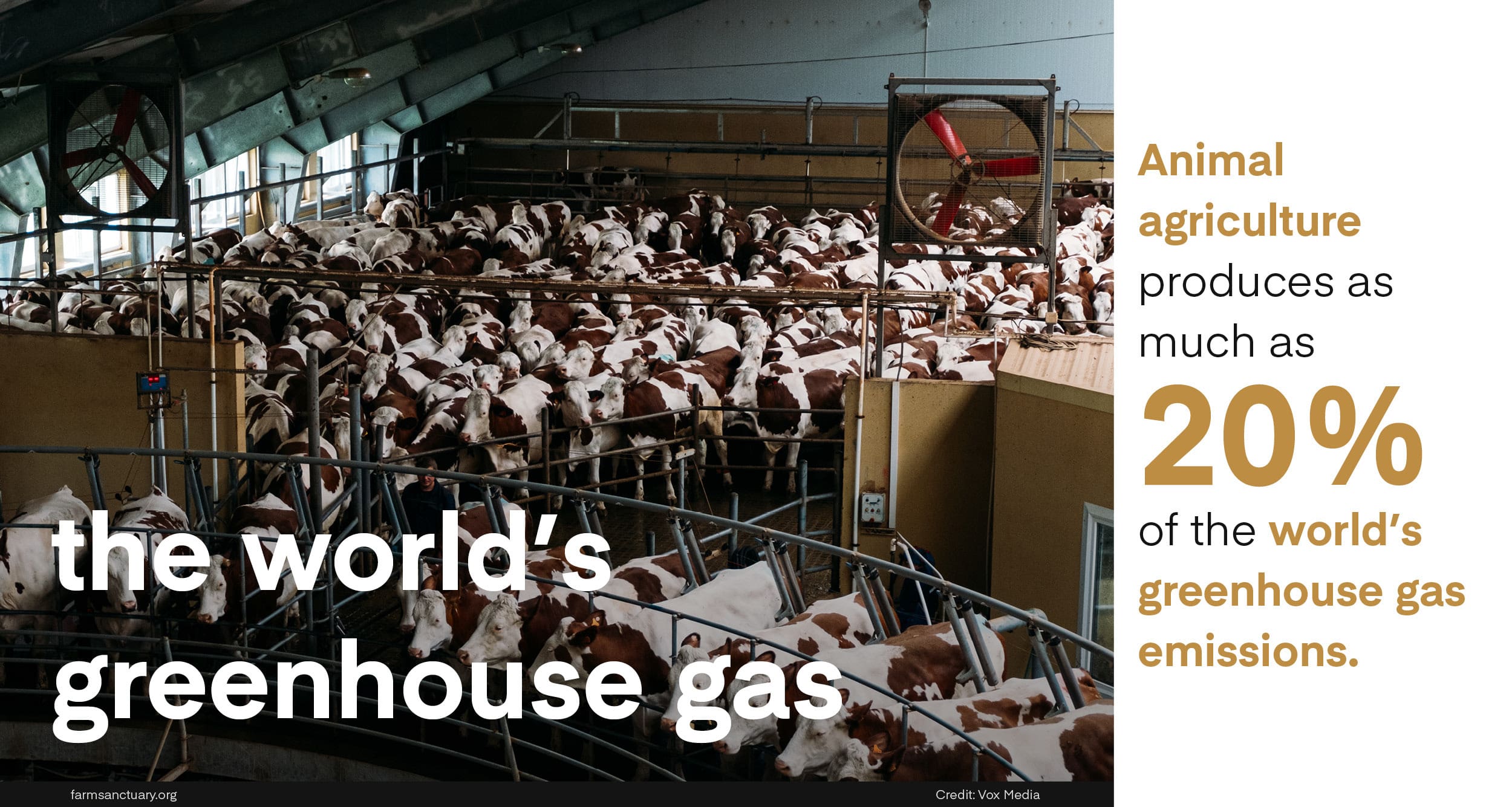As the urgency of the climate crisis becomes ever more apparent, many individuals are seeking actionable ways to contribute to environmental sustainability. While reducing plastic use and conserving water are common strategies, an often overlooked yet highly impactful approach lies within our daily food choices. Nearly all U.S. farmed animals are kept in controlled animal feeding operations (CAFOs), commonly known as factory farms, which have a devastating toll on our environment. However, each meal presents an opportunity to make a difference.
The Intergovernmental Panel on Climate Change’s Sixth Assessment Report, released in March 2023, emphasized the narrowing window to secure a liveable and sustainable future, highlighting the critical role of immediate action. Despite mounting scientific evidence, industrial animal agriculture continues to expand, exacerbating environmental degradation. The latest USDA census reveals a troubling trend: while the number of U.S. farms has decreased, the population of farmed animals has surged.
Global leaders must enact swift and meaningful policies to address this crisis, but individual actions are equally vital. Adopting a plant-based diet can significantly reduce one’s carbon footprint, alleviate pressure on overfished oceans, and combat deforestation. Moreover, it addresses the disproportionate impact of animal farming on biodiversity, as underscored by a 2021 Chatham House report.
Animal agriculture is responsible for up to 20 percent of global greenhouse gas emissions and is a leading cause of methane emissions in the U.S. Transitioning to plant-based foods can dramatically lower these emissions. The United Nations reports that switching to a vegan diet can reduce an individual’s carbon footprint by over two tons annually, offering additional benefits of improved health and cost savings.
Moreover, the environmental and public health impacts of factory farms extend beyond emissions. These operations contribute significantly to air pollution-related deaths and produce vast amounts of waste that contaminate water sources, disproportionately affecting low-income and minority communities. Additionally, the risk of zoonotic diseases, which can jump from animals to humans, is heightened by the conditions in factory farms, posing further public health threats.
By choosing a plant-based diet, individuals can take a powerful stand against these environmental and health challenges, contributing to a more sustainable and equitable future.

So You Want to Help the Environment? Change Your Diet.
Nearly all U.S. farmed animals are kept in controlled animal feeding operations (CAFOs), commonly known as factory farms. These industrial farms take a devastating toll on our environment—but there’s something you can do about it every time you eat.
In March 2023, the Intergovernmental Panel on Climate Change’s Sixth Assessment Report warned policymakers, “There is a rapidly closing window of opportunity to secure a liveable and sustainable future for all…The choices and actions implemented in this decade will have impacts now and for thousands of years.”
Despite the overwhelming scientific evidence that industrial animal agriculture harms our planet, factory farming continues to intensify. According to the latest USDA census, the number of U.S. farms has dropped while the number of farmed animals across the country has risen.
World leaders must take swift, meaningful, and cooperative action to address the climate crisis we’re all facing. But we can each do our part as individuals, and you can start today.
When you choose a plant-based diet, you will:
Nearly 7,000 species in danger of extinction are at immediate risk from climate change.
A 2021 report by think tank Chatham House named agriculture a threat to 85 percent of the 28,000 species in danger of extinction at that time. Today, the total has skyrocketed to 44,000 species facing extinction—and almost 7,000 are at immediate risk from climate change, which is worsened by animal farming.
Alarmingly, a 2016 report published in Nature had already named agriculture a more significant danger than climate change to almost 75 percent of the world’s threatened species, including the African cheetah.
There is hope, though. By choosing a plant-based diet, one can help to ease pressure on our overfished oceans, oppose the pollution caused by factory farms, fight the loss of forest habitats and other land (see more below), and more.
The Chatham House report urged a global shift to “diets based more on plants” in response “to the disproportionate impact of animal farming on biodiversity” and other environmental harms.

Animal agriculture produces as much as 20 percent of the world’s greenhouse gas (GHG) emissions and is the top cause of U.S. emissions of methane—a GHG far more potent than carbon dioxide.
Luckily, the power of plant-based foods to reduce emissions is impressive. The United Nations (UN) has reported that switching to a vegan diet can slash an individual’s carbon footprint by over two tons annually. The UN writes, “With the availability of meat substitutions, vegan chefs and bloggers, and the plant-based movement, eating more plants is becoming easier and more widespread with the additional benefits of better health and saving money!”

Animal agriculture has been linked to 80 percent of the 15,900 U.S. deaths related to air pollution from food production each year—an avoidable tragedy.
Industrial animal farms also produce a massive amount of animal waste. This manure is often stored in open-air “lagoons” that can seep into groundwater or, during storms, overflow into waterways. It is usually stored until being sprayed as fertilizer, often impacting surrounding communities.
Furthermore, factory farms are often located in low-income neighborhoods and among communities of color and disproportionately impact the people who live in these areas. For example, three North Carolina counties whose residents are predominantly Black, Latine, and Native American contain the largest number of the state’s pig factory farms—and the Environmental Working Group found that from 2012 to 2019, the number of farmed birds in these same counties increased by 36 percent.
A global shift to plant-based diets could slash agricultural land use by 75 percent.
Three out of every four emerging infectious diseases originate in animals. Despite the public health risks posed by zoonotic pathogens (those that can be transmitted between animals and humans), factory farming continues to expand in the U.S. as many experts warn that to prevent pandemics, we have to address this harmful industry.
At first glance, this issue may seem unrelated to the environment, but our risk of zoonotic illness increases with worsening climate change and environmental destruction due to rising temperatures and habitat loss, which pushes humans and wildlife closer together.
The continued spread of bird flu throughout the poultry and dairy industries exemplifies this danger. Already, a variant never before found in humans has emerged, and as the virus continues to mutate and agribusiness chooses not to respond, bird flu could become more of a threat to the public. By opting out of consuming animal products, you will not be supporting the factory farming system that facilitates the spread of disease in filthy, overcrowded facilities.
And so much more.
Protect our planet

Nikola Jovanovic/Unsplash
It all boils down to this: Factory farming is driving climate change, and a plant-based diet is the most effective way for individuals to oppose its ecological harms.
Farm Sanctuary can help you get started. Browse our handy guide to plant-based eating, then find more ways to stand up for animals and our planet here.
Eat Green
Notice: This content was initially published on FarmSanctuary.org and may not necessarily reflect the views of the Humane Foundation.















































